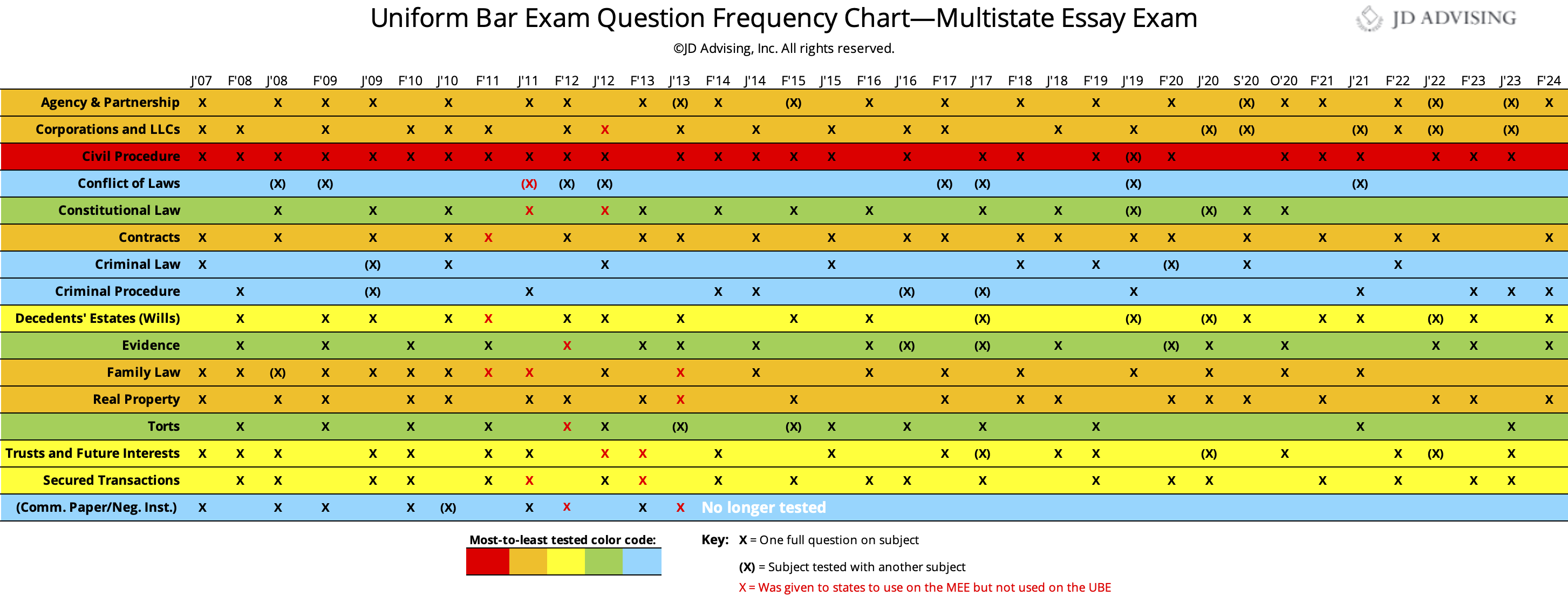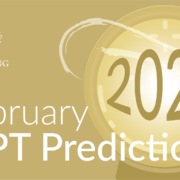MEE Subjects: What You Need to Know to Pass the MEE
 MEE Subjects: What You Need to Know to Pass the MEE
MEE Subjects: What You Need to Know to Pass the MEE
If you are taking the Multistate Essay Exam (MEE), (which is administered in several states, including those that administer the Uniform Bar Exam), you may wonder exactly which MEE subjects you need to know. There are 14 subjects that are fair game for the MEE. (You can see these in the chart above and you can click on it to make it bigger. If you are looking for an updated frequency chart, check out this post.)
MEE Subjects:
- Agency & Partnership
- Corporations & LLCs
- Civil Procedure
- Conflict of Laws
- Constitutional Law
- Contracts
- Criminal Law and Procedure
- Evidence
- Family Law
- Real Property
- Torts
- Trusts and Future Interests
- Decedents’ Estates (Wills)
- Secured Transactions
A few notes on these MEE subjects:
- Commercial Paper (Negotiable Instruments) used to be tested on the MEE but no longer is. (So if you see references to that in your study material, you can ignore it!)
- Not all subjects are tested equally. For example, Civil Procedure is tested more often than any other subject. Further, Conflict of Laws is not tested very often and is not a standalone subject (meaning, you will always see it combined with another subject–usually it is tested with Civil Procedure or Family Law but has occasionally been tested with Wills).
- Sometimes a subject is combined with another subject. For example, Torts and Agency are frequently tested together. And Evidence and Criminal Procedure are frequently tested together.
- To read more about the highly tested MEE subjects, see this post. To read more about the highly tested MEE topics within each subject, see this post.
How is the MEE structured?
The MEE is administered on the first day of the bar exam (Tuesday). You will have three hours to answer six MEE questions. (Thus, you should plan on spending about 30 minutes per question in order to finish the exam on time.) Not all 14 subjects are tested on every MEE. Rather, usually six subjects are chosen (and occasionally you will see more–for example if two subjects are tested together, then technically more than six subjects are tested).
Note that if you are taking the MEE in a Uniform Bar Exam jurisdiction, you will be expected to apply general law rather than a specific state law.
How is the MEE different than a law school exam?
The MEE essays you will write are shorter (30 minutes per essay). Unlike law school exams, in an MEE:
- The issues are often identified for you (e.g., there is a clear call of the question that will tell you what to discuss). You should not discuss every issue that comes to mind or “outline dump”.
- Using IRAC is very important for organization purposes.
- The examiners are not looking for a lengthy background on the law or a policy analysis.
- Usually, you will not be expected to argue both sides–and if you are, you will not be doing this to the same extent as you would in a law school answer.
- The conclusion is important. Points will be deducted from your score if you arrive at an incorrect conclusion.
Seeking MEE Expertise?
🌟 Freebies & Discounts
- Free Bar Exam Resource Center: Explore for leading guides, articles, and webinars.
- Expert-Crafted Bar Exam Guides: Unveil insights on high-frequency MEE topics and strategies for success.
- Free Webinars: Engage with top bar exam experts.
🔥 Top-Rated MEE Resources
- MEE One-Sheets: Boost your confidence with our most popular bar exam product!
- Bar Exam Outlines: Our comprehensive and condensed bar exam outlines present key information in an organized, easy-to-digest layout.
- NEW MEE Mastery Class: Unearth focused, engaging reviews of essential MEE topics.
- Bar Exam Crash Course and Mini Outlines: Opt for a swift, comprehensive refresher.
- MEE Private Tutoring and feedback: Elevate your approach with tailored success strategies.
- MEE Course: Preview our acclaimed five-star program for unmatched instruction, outlines, and questions.
🔥 NEW! Dive deep into our Repeat Taker Bar Exam Course and discover our unrivaled Platinum Guarantee Pass Program.





Leave a Reply
Want to join the discussion?Feel free to contribute!